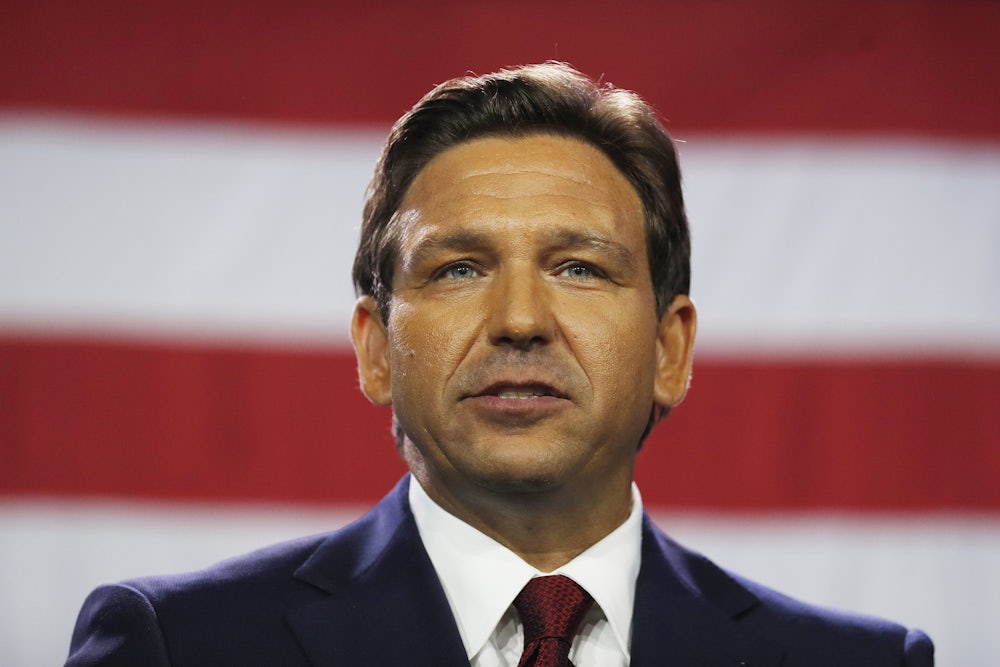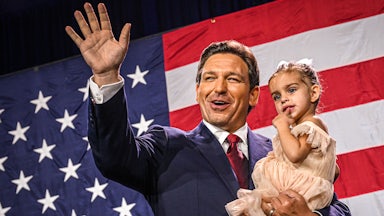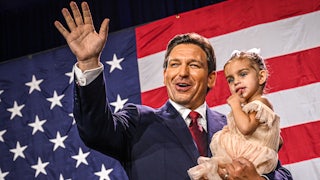In a late-November conversation on Twitter, Elon Musk confessed that he “reluctantly” voted for Biden over Trump in 2020 and that his “preference for the 2024 presidency is someone sensible and centrist.” When asked point-blank if “sensible and centrist” meant that he might support Ron DeSantis, the then–richest man in the world confirmed that he will be backing the Florida governor, before adding “but Twitter as a platform must be fair to all.”
You could be forgiven for rolling your eyes at Elon’s misinterpretation of American politics. But DeSantis-the-moderate is not just an Elon idea. The perception of Ron DeSantis—the book-banning Florida governor who shipped asylum-seekers from red Texas to blue Massachusetts and who is now calling on the Florida Supreme Court to empanel a grand jury to investigate Covid-19 vaccines—as “sensible and centrist” has actually taken hold in the minds of many Americans. This notion is fueled primarily by the now-constant comparisons between the Florida governor and Donald Trump, who looms over the Republican Party.
Because he so forcefully subjugated the GOP, Trump has become the standard measuring stick by which every potential 2024 Republican presidential nominee is judged. And it’s hard for most people not to come off favorably when contrasted with Trump. DeSantis, however, is pushing into new territory: A new Wall Street Journal poll has the Florida governor besting Trump in its early head-to-head matchup, the latest in a growing clutch of surveys that suggest the former president’s weakening public profile is no joke.
The problem with the DeSantis-Trump comparison is that American politicians have always been judged upon a linear political spectrum—from left to right. But comparisons to Trump are usually grounded in aesthetics and attitudes, not policies and politics. While DeSantis is consistently perceived as “more moderate” than Trump along these lines, it’s difficult to look at his policy record and conclude that he sits to the left of the former president. DeSantis, The New Yorker says, is “Trump with a brain,” but that doesn’t make him a sensible centrist. A recent Washington Post opinion column argued that “given the bizarre state of American politics during the Trump era, DeSantis would represent a return to normality.” But again, just because DeSantis isn’t visibly unraveling does not make him a political moderate. Here, a look back at his actual policy record might help better illuminate exactly where DeSantis falls on the typical left-to-right political spectrum.
During his three terms in Congress, DeSantis sponsored 52 bills. In his first term (2013–2014), those bills were mostly messaging legislation attacking Obamacare. He introduced one bill that would have required Obama to participate in Obamacare and, later, a resolution that accused Obama of “[usurping] the legislative authority of Congress” by passing Obamacare. Scanning through his congressional record, it becomes obvious that DeSantis’s Washington tenure is simply that of a congressman with his eyes on higher office. In fact, his freshman term was the only term in which he didn’t run for higher office—during his second term, he briefly ran for Florida’s open Senate seat until Marco Rubio’s presidential attempt went up in flames and “little Marco” returned to the Senate.
In the entirety of his three terms in Congress, not a single bill that Congressman Ron DeSantis wrote became a law. During his second term, his bills were often aimed at Islamic terrorism. He authored one bill to tighten sanctions on Iran and another that would have restricted refugees from Muslim-majority nations (DeSantis introduced his bill only days before Trump announced his Muslim ban). In June 2016, he attempted to pass a resolution designating July 15 as “Sister Cities International Day.” The resolution died in committee.
Though his tenure in Congress was legislatively unsuccessful, DeSantis—a founding member of the Freedom Caucus—spent his years in Washington playing the perceptions game and developing himself into the Trumpist-but-not-Trump figurehead he has become. During his final term in Congress, he introduced a bill titled the “Drain the Swamp Act,” which he announced alongside an op-ed in The Orlando Sentinel under the headline “Trump wants to drain the swamp: Here’s how I’ll do it.” A few months later, as he was running for governor, DeSantis released a campaign ad fawning over Trump, reading the Art of the Deal to his daughter and encouraging her to “build the wall” with a set of toy blocks.
That commercial aired during the Republican gubernatorial primary as DeSantis was trailing a longtime Florida politician named Adam Putman. The cringeworthy ad (over which Trump has since teased DeSantis) was part of DeSantis’s campaign to tie himself to Trump—a campaign that proved successful. After reportedly discovering him on Fox News, Trump endorsed DeSantis, and the previously unremarkable congressman rode his Trump endorsement into the governor’s mansion. When The New York Times interviewed DeSantis in the summer before his 2018 election, the eventual governor “declined to name a single issue on which he disagreed with Mr. Trump.”
As a governor, DeSantis has made some moves that his advocates argue make him palatable to those who fetishize bipartisanship. In May, he received a wave of press coverage for signing a series of tax cuts that merit some applause. He put in a one-year sales tax exemption on diapers and baby clothes. Naturally, these tax cuts were a naked effort to expand his already high statewide popularity—he also eliminated the sales tax on Nascar tickets. But these were still tax cuts that eased the burden on working families, and DeSantis deserves some credit for those measures. Outside of these exceptions, however, his tax policies look the same as Republican tax policies have for decades. As a congressman, he supported Trump’s tax bill that came as a boon to wealthy individuals and big corporations. As governor he quietly handed out hundreds of millions of dollars in tax cuts to large corporations.
His advocates also claim that DeSantis is a moderate on the environment—this is such a common contention that it was recently posted on the eavesdropping D.C. Twitter account Overheard District. (At a wine bar, a man tells a woman, “I’m a liberal for DeSantis” because DeSantis “really cares about the environment”.) DeSantis-the-governor does often emerge on the left flank among Republicans on environmental issues. He’s come out against fracking and drilling in his home state. For the most part, though, he opts to throw money at whatever climate problem crops up. Instead of addressing the systemic issues like carbon pollution that contribute to global warming, he has put money into building stormwater pumps, dismissing a broad agenda to combat climate change as “left-wing stuff.”
The more dominant characterization that DeSantis has crafted during his tenure is one of a camera-hungry culture warrior with an ax to grind, not a policy wonk with big ideas. His most recent stunt came on Tuesday when he convened a roundtable to declare an anti-vax fishing expedition—pushing for a grand jury to investigate “any and all wrongdoing in Florida with respect to covid-19 vaccines.” His announcement was largely absent of specific allegations but big on trigger-word rhetoric. At one point, he accused the Centers for Disease Control and Prevention of “serving to advance narratives rather than do evidence-based medicine.” Hours later, he appeared on Fox News prime time to claim victory in his manufactured culture war.
Occasionally, he even behaves as an authoritarian in this war. As the “Big Lie” swept the country, DeSantis boasted that he was cracking down on voter fraud—he arrested unwitting Florida voters (most of whom were Black) and then, hours later, he called a news conference to tout his own pseudo-accomplishment. Many of those arrested say that government entities told them they had the right to vote.
And then, of course, there’s the case of Andrew Warren, the state attorney elected in Hillsboro County. Warren said that he would not prosecute DeSantis’s ban on gender-affirming surgery for minors, and DeSantis suspended him. When asked about the governor’s action (which was, of course, announced during a press conference), Warren said, “None of those cases have been brought to us. We’re not anticipating those cases being brought to us.”
DeSantis’s list of flirtations with authoritarianism is a long one; his illiberal leanings have had a cruel and measurable impact on the lives of Floridians. There are the LGBTQ teachers who lost their jobs following DeSantis’s signing of his “Don’t Say Gay” bill. There is the Jewish mother who was told by her son’s school that, as a result of DeSantis’s Parents’ Bill of Rights, she could no longer give her annual Hanukkah presentation to the class. And there are, of course, those Venezuelan refugees whom DeSantis tricked into a one-way ticket to Martha’s Vineyard, which was a rather blatant entreaty to the racist wing of the Republican Party that ballooned under Trump.
And while DeSantis supporters praise him as the GOP’s return-to-normal candidate, they hesitate to mention that it is now normal for Republican politicians to occasionally cater to racists. DeSantis’s decision to relocate refugees in the cruel way he invented was simply his way of signaling to the racist wing of the GOP that they’ve got a hero in Ron just as they had in Trump.
The governor’s strategy toward the extremism in his party has generally been to emulate Trump’s “very good people on both sides” rhetoric. When asked about the more vile ideologies that exist among his supporters, DeSantis has bent over backward to avoid denouncing them. After a Confederate flag was flown over a Jacksonville Jaguars game, DeSantis was asked if he’s concerned at all about hate speech—the governor’s response: “I’m concerned about people in the media trying to manufacture division all the time.” More recently, he has stayed deafeningly silent on Trump’s dinner with a Holocaust denier and has reportedly told his allies not to criticize Trump over the meeting. Many Republicans (particularly those not as interested in the presidency as DeSantis) have come forward to denounce Trump over the dinner.
Believe it or not, there actually are some moderate Republicans still kicking around. Maryland Governor Larry Hogan may be leaving office, but he still enjoys something of a public profile. Representatives Dusty Johnson of South Dakota and Dave Joyce of Ohio are also cut from non-Trump cloth. These figures stand legitimately to the left of DeSantis, but they lack his naked ambition. They don’t announce political stunts at press conferences or play games with people’s lives. But in the party of Trump (and the GOP is still very much the party of Trump), the moderate Republicans have simply become irrelevant. And as the sensible Republican species fades into the ether, DeSantis is what passes as the “return to normal.” DeSantis’s own record really can’t sustain this idea, but in the end, this may be beside the point: Nothing in the post-Trump Republican Party is truly normal.










